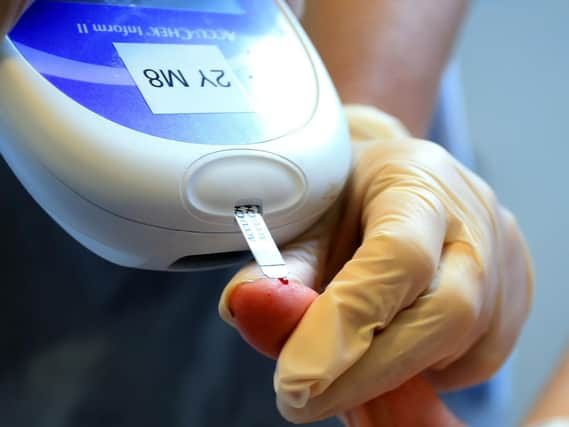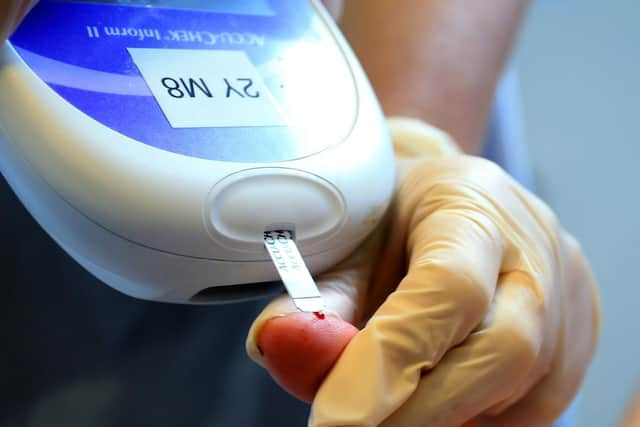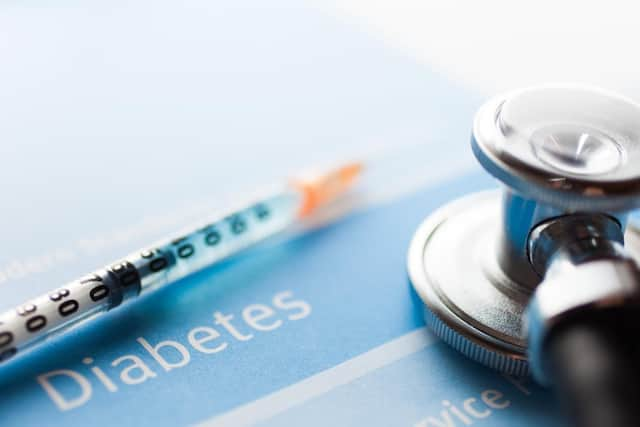REVEALED: NHS spending £3.75 million a year on Preston's diabetes prescriptions


The NHS Greater Preston Clinical Commissioning Group spent £3.75m on prescribing medicines for the condition between April 2017 and March 2018, accounting for some 218,000 prescriptions.
In 2014/15 prescriptions cost £3.18 million, with some 26,000 fewer issued.
Advertisement
Hide AdAdvertisement
Hide AdOverall diabetes drugs accounted for a tenth of money spent on prescriptions in Preston.


A further £1.07 million was also spent on insulin, and £650,000 on devices to monitor diabetic patients’ health including glucose monitors or fitness trackers.
The revelation has led to charity Diabetes UK stating that the increasing expenditure on prescriptions is down to the rising number of diabetics in the city.
Chris Bradburn has lived with Type 2 diabetes for 18 years after being diagnosed when he was 58.
Advertisement
Hide AdAdvertisement
Hide AdThe former BAE Systems flight test engineer, now 76, was found to have too much glucose in his urine during an annual medical check.


For Chris, essential lifestyle changes have been the key to stopping the condition worsening – which has included cutting down carbohydrate and sugar intake and taking up regular exercise.
“It is possible that if you make key lifestyle changes, it can be put off a bit,” Chris explained.
“The rate of change is really up to you and how you live your life.”
Advertisement
Hide AdAdvertisement
Hide AdTo this day he goes to the gym twice a week, saying: “I go to maintain who I am, not to build muscle up, just to maintain my fitness levels and improve my blood pressure.”


Chris, who is from Freckleton and is the Diabetes UK Service Champion for the Fylde Coast, stresses that those diagnosed with diabetes “need to take notice of what you are being told and do what you can as best you can”.
He explained: “There’s a lot of denial and lack of awareness of the seriousness of the condition.
“We are talking to a lot of people who you would think have a lot of knowledge but are still unaware of the ramifications.
Advertisement
Hide AdAdvertisement
Hide Ad“We know the biggest risk factor is obesity but it is not the only thing to worry about. People who aren’t overweight think they might be fine.


“Please be aware that diabetes is going around in the under 40s and in children. I know of a 10-year-old boy who was diagnosed and it comes to what they are eating.
“It used to be called ‘late onset’ – but not anymore.”
Chris added: “We are spending around 10 percent of the NHS budget nationally on diabetes. It’s a lot of money for one condition. Around 80 per cent is used to stop the complications [such as] heart attacks, strokes.
“So if we can get that down we can save quite a bit of money.”
Steve Tingle was diagnosed with Type 2 in 2007.
Advertisement
Hide AdAdvertisement
Hide AdEleven years on, he is now close to completing his sixth marathon in just this year.


The 55-year-old, who works as Head of Operations for Children & Young Peoples Wellbeing Network at Lancashire Care NHS Foundation Trust, said: “I was never overweight and active but suffered from a sweet tooth.
“Exercise has helped me manage the condition to the point where my blood sugar is pretty normal. It’s been a bit of a lifesaver for me.”
Steve, from Chorley, added: “In my view, sugar is as addictive as alcohol and cigarettes. It’s about combatting [the effects] through exercise.”
Advertisement
Hide AdAdvertisement
Hide AdProfessor Jonathan Valabhji, national clinical director for diabetes and obesity of NHS England, said: “Thanks to better diagnosis and treatment, the NHS is caring for more people than ever before with diabetes and this new data highlights the urgent need to prevent Type 2 diabetes from developing in the first place.
“The NHS Diabetes Prevention Programme has now reached over a quarter of a million people at high risk of Type 2 diabetes.”
Robin Hewings, head of policy at the charity Diabetes UK, said: “The number of people diagnosed with Type 1 and Type 2 diabetes has doubled in the last 20 years, so it’s no surprise that the cost of medications has increased.
“The number of diabetes-related amputations in England is now at an all-time high, with more than 8,500 procedures being carried out each year.
Advertisement
Hide AdAdvertisement
Hide Ad"This equates to 24 minor and major amputations per day, or more than 160 a week.
“As well as helping people reduce their risk of diabetes through the NHS’s diabetes prevention programme, we should focus on spending more money now on helping people manage their diabetes well.”